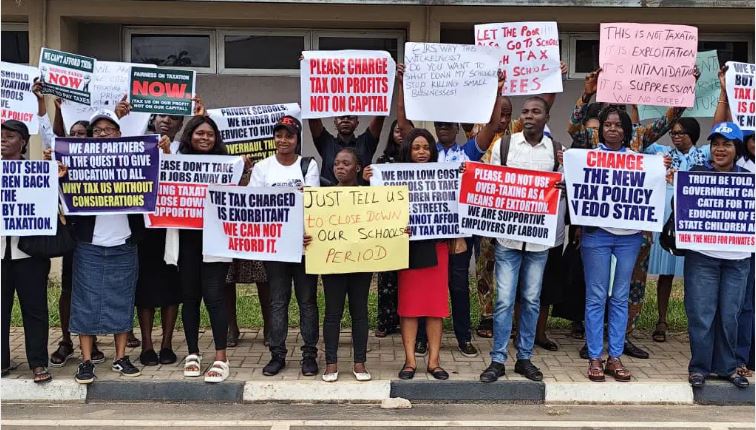The Coalition of Associations of Private Schools (CAPS), an umbrella body representing private school owners in Edo State, Nigeria, embarked on a peaceful demonstration in Benin City to protest a substantial increase in personal income tax. The protest, held at the Edo State Ministry of Education, saw participants carrying placards and banners, expressing their discontent with the tax hike, which they claim ranges from 200% to a staggering 400%. CAPS, comprising key educational organizations such as the Association of Private School Owners of Nigeria, the Association for Formidable Education Development, the National Association of Proprietors of Private Schools, and the Association of Model Islamic Schools, argued that the increased tax burden is punitive and poses a significant threat to the private education sector in the state. They called for an immediate reversal of the policy, emphasizing the detrimental impact it could have on both employment and the overall economy.
Dr. Ohis-Olakhe Emmanuel, the Chairman of CAPS, led the protest and voiced the coalition’s strong opposition to the tax increase. He underscored the vital role private schools play in supporting the government’s educational efforts and highlighted their significant contribution as employers of labor. Dr. Emmanuel expressed concern that the exorbitant tax hike could lead to the loss of over 300,000 teaching jobs, further impacting the livelihoods of countless vendors and service providers who rely on schools for their income. He criticized the new tax policy, which, he explained, bases its calculations on a flat rate of N30,000 to N35,000 per student, irrespective of the significantly lower fees charged by many schools. This blanket approach, he argued, fails to consider the varying economic realities of different schools and disproportionately affects those catering to lower-income families.
Further amplifying the concerns raised by the Chairman, Dr. Austin Igbasan, the Secretary of CAPS, warned of the potentially devastating ripple effect the increased tax burden could have on the entire education ecosystem. He stressed the interconnectedness of various stakeholders within the sector and cautioned that the increased financial strain on private schools could lead to a decline in the quality of education and limit access for many children. Mr. Oladele Ogundele, the Secretary of AFED, added his voice to the protest, calling for a standardized and equitable tax regime. He pointed out the already existing burden of multiple levies imposed by various government agencies, including personal income tax, PAYE for staff, school renewal fees, environmental and health certifications, signage fees, tenement rates, and other charges. This multiplicity of levies, he argued, places an undue strain on private schools and hinders their ability to operate effectively.
In response to the protest, Mr. Paddy Iyamu, the Edo State Commissioner for Education, addressed the concerns of the coalition, assuring them that the state government would carefully review their demands. He promised to facilitate a meeting with the Edo State Internal Revenue Service to discuss the tax increase and explore possible solutions. Mr. Iyamu acknowledged the importance of taxation for government operations but emphasized that the intention was not to overburden schools. He recognized the crucial role private schools play in the state’s educational landscape and expressed a willingness to work towards a mutually beneficial solution. This acknowledgement from the Commissioner offered a glimmer of hope for the protesting private school owners, suggesting a potential pathway towards resolving the contentious issue.
While acknowledging the concerns of the private school owners, Mr. Iyamu also used the opportunity to address the issue of substandard schools operating within the state. He urged proprietors of such schools to take immediate steps to improve their facilities and educational standards. He warned that the state government would soon implement stricter regulatory measures to ensure compliance with established standards. This firm stance on quality control underscores the government’s commitment to ensuring that all students in Edo State receive a quality education, regardless of whether they attend public or private schools. The Commissioner’s message, therefore, served a dual purpose: addressing the immediate concerns of the protesting private school owners while also reinforcing the government’s broader commitment to improving the overall quality of education in the state.
The protest by the Coalition of Associations of Private Schools in Edo State highlights the complex interplay between government revenue generation, the role of the private sector in education, and the need for a balanced approach to taxation. The private school owners argue that the drastic increase in personal income tax threatens the viability of their institutions, potentially leading to job losses and a decline in the quality of education. The government, while acknowledging the need for a reasonable tax structure, also emphasizes the importance of maintaining and improving educational standards across the state. The promised dialogue between the coalition and the Edo State Internal Revenue Service represents a crucial step towards finding a resolution that addresses both the financial concerns of private schools and the government’s commitment to providing quality education for all. The outcome of this dialogue will significantly impact the future of private education in Edo State and could serve as a precedent for similar situations in other parts of Nigeria.














